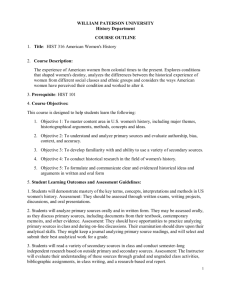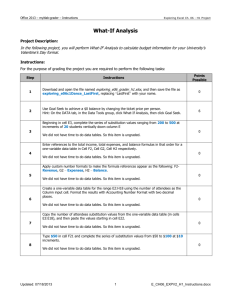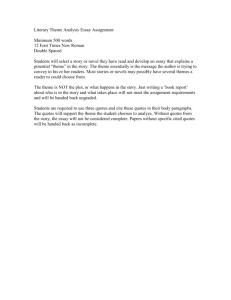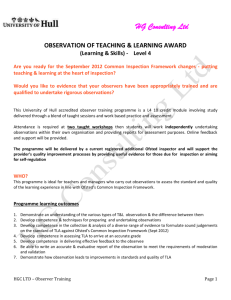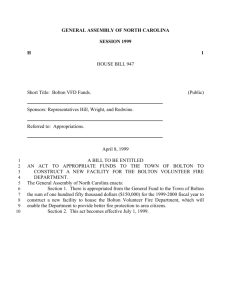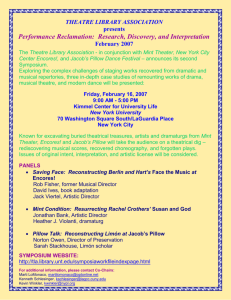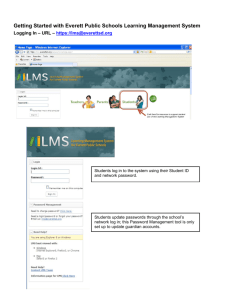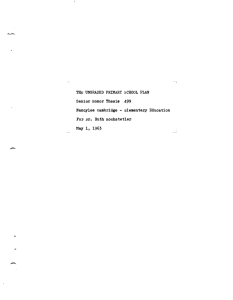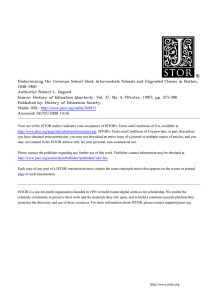ppt - University of Wolverhampton
advertisement
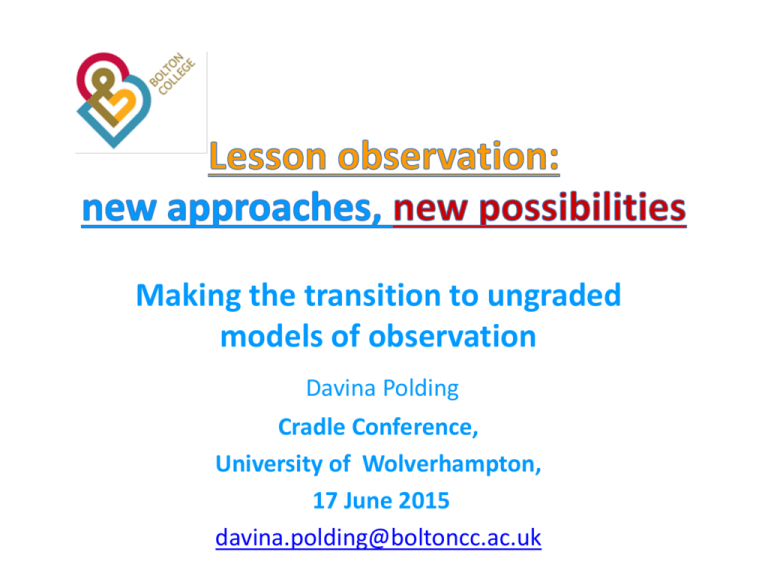
Making the transition to ungraded models of observation Davina Polding Cradle Conference, University of Wolverhampton, 17 June 2015 davina.polding@boltoncc.ac.uk Welcome and Aims • To share approaches made by Bolton College in introducing ungraded observations from 2014/15 Objectives By the end of the presentation you will be able to: Define perceived barriers to the ungraded model Analyse benefits of moving to ungraded Consider key project management stages Start a simple action plan towards change Action plan for your notes Points to consider What action do I need to take Who do I need By when to communicate with/Action by Start a simple action plan towards change Background and new research • Prior to Sept 2014 Bolton College had several years of a very good graded observation profile - why change? • 2013/14 research by Dr. Matt O’Leary caused reflection on what observation is for. O’Leary, M (2014) Classroom Observation- A Guide to the Effective Observation of Teaching and Learning. Oxford: Routledge Why do we do observations? • Key driver to support continuous improvement in Teaching, Learning and Assessment • Heads of Area, Curriculum managers, APs and agencies, external observers • Once a year formally – actions to share good practice or address areas for development • Walk-throughs and in-situ Quality Cycle Background and rationale • • • • Ofsted 2 day model of a week of observations Was it a true picture? Grade 1, ‘show ponies’? Grade 2 coasting/stagnating with “over for another year” syndrome? • Grade 3 really owning and maintaining improvement ? The Power of Coaching 4 years -coaching and developmental approach – ‘Take a Chance on Change’ project Based on Geoff Petty’s supported experiments’ model with Joanne Miles APs and TACOC facilitators supporting teams to try new and innovative TLA Taking ‘safe’ risks • TACOC enthuses teachers to try something new in the classroom- not graded • TACOC was a real strength in our Higher Education Review • Changed the culture- peer-sharing and ungraded observations work in harmony • Do staff really need a grade for formal observations? Perceived barriers Networking activity • In pairs or small groups consider for a few minutes- what do you fear in terms of not grading? Perceived barriers • SMT and governance concerns and need for measurement reporting? • Peer pressure- other colleges ? • Unions’ reaction? • Teachers’ reactions? • Timelines and project management challenges? • Ofsted? Hurdles Bolton College overcame • Communication, communication, communication • Teachers as Professionals - professional dialogue • Reflective Practitioners-observed tutor completes reflective document to prepare • Heads of area and Curriculum Leaders observe • Coaching model by Advanced Practitioners Hurdles Bolton College overcame • Communication, communication, communication • 15 Teaching, Learning and Assessment standards and self-assessment • Learner-facing posters • Mind set and skill set of the observers training and following up showed they don't just transform into ungraded developmental observers by magic Hurdles Bolton College overcame • ‘Really well’, ‘well’, ‘not as well as it could be’, ‘not well enough’ • ‘Red Spot’ option • Evidence of planning but a session plan not mandatory • Inadequate TLA re-observed then can lead to formal performance management • Learner Voice and assessed work blended in Hurdles Bolton College overcame • Still a way to RAG rate areas re TLA for SARs and performance review • Split the TLA standards into 3 key areas ‘planning’, ‘delivery’ and ‘assessment and feedback’ • Importance of timely SMART targets tracking and closing the loop What are the benefits? Networking activity In pairs or small groups for a few minutes consider the potential benefits of moving to an ungraded model Benefits of moving to ungraded • “peer-based models of observation have been shown to offer the potential to enhance pedagogic understanding and in turn contribute to the on-going process of teacher development” (2014,p155) • “ a community of professionals collaborating and sharing knowledge and experience” (2014,p156) Benefits of moving to ungraded • “the desire to encourage teachers to be the best they can possibly be and in turn to encourage their learners to continuously strive for success” (2014,p155) Quotes from tutors Well, you can never win them all: “ I wish we had the graded model back; I like to know what number I get” Quotes from tutors “I felt the process was less judgemental. I felt it was an opportunity to get some feedback on my teaching and get some advice for future practice.” “I do feel that the ungraded observation is a good idea as it relieves a great deal of pressure from the tutor who is being observed and it eliminates the "what did you get" question in the staffroom which can be embarrassing for tutors who get low grades.” Quotes from tutors “I liked the discussion part and action plans as they are very useful.” “This year’s observation process I felt has been much more relaxed and less threatening due to the fact the grading system was not in place.” Quotes from tutors “I am wholly supportive of the ungraded observations model. However any observation becomes counterproductive if the observer has insufficient time to provide meaningful feedback in a timely fashion. I was fortunate enough to have xxxxxx as an observer and benefited greatly from her observation.” Quotes from tutors “I didn’t need to focus on my grade just what went well and I knew that if I had any areas for development, I would receive the support I needed. I also looked forward to sharing what went well (SGP). Even though I didn’t get a grade I could work out what it was from the feedback but I knew there was less focus on the observation just being about a grade.” Quotes from observers “With a weaker teacher, the new process worked well – a more open, less defensive and conflictive discussion, as it wasn’t fixed on debating the grade. It allowed for a more balanced discussion of strengths and areas for development.” “With strong teachers delivering strong lessons, it has been helpful to broaden the conversation into what their next step is; their aspirations at work; looking beyond simple AfD to wider learning through research, using social networks, connecting to other institutions.” Key project management stages May 2014 TLA standards and draft handbook designed June/July June-Senior management approval June/July- Cascaded to the Unions and finalised handbook Staff completed self-assessment forms and highlighted support as required from APs September Tour of the areas to spread the word 26 staff meetings. Induction walk-throughs. Oct/early Nov Peer sharing TACOC for 3 weeks Late Nov Launch of formal observations until Feb half-term Early Jan 2015 Cluster groups to review project. SMART targets needed to be tightened up. SMART targets bank designed and circulated. Nov- April Closing the loop on development and sharing good practice June Evaluation and reporting to SMT Ofsted and TLA • Nobody expects …..Ofsted in March 2015 • TLA grade 2- all paired observations were agreed • Inspectors liked the TACOC and also the ungraded approach to developing TLA • The new CIF will not grade individuals Lessons we learned • Observations –schedule and chase • Some anxiety about it being unannounced • Some grade one teachers want the badge of honour • Triangulating information has worked well – observation, student feedback and file review • Consider impact on the learners even more Lessons we learned • Setting a date to close the loop on the actions in the initial feedback meeting • Emphasise that this new process is about development for all the team-moving beyond simple assessment of the individual • Plan to start the observations earlier next year, risk-based so that the focus is on the coaching and sharing that follows Action plan for change • Thank you for listening • Please use any remaining time to ask questions and to make any more notes on action plans
